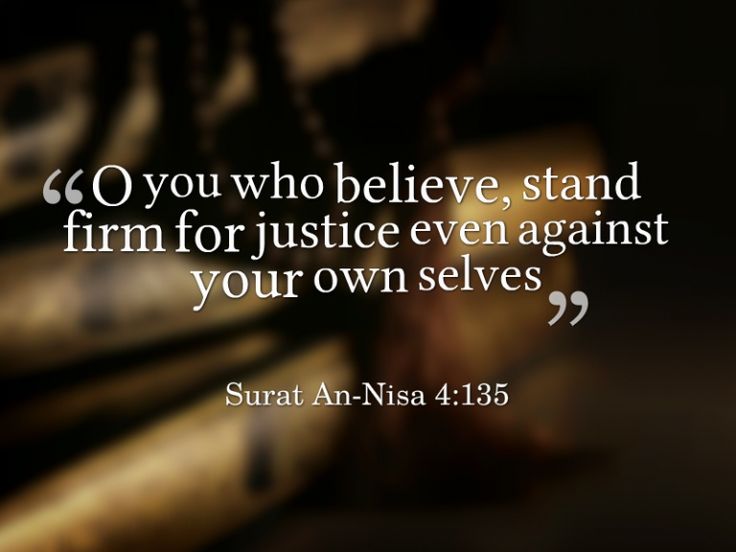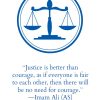- Phone No.: +44 7920015304
- Email:info@theislamicemailcircle.com
Practise JUSTICE in your life, A Must To Read- Part 1
Allaah loves those who practise Justice
by Ayub A. Hamid
Being Just is an important part of the Islamic personality. Whether we are judging among people informally, settling disputes among the people around us or formally in the court as a judge or jury, we must practise justice.
The kind of individuals Islam wants to develop and the society that Islam wants to establish is summarised in one verse of the Holy Qur’aan forming the basis of a person’s attitude and paradigm of one’s lifestyle as well as a society’s mission statement or statement of objectives:
“Verily, Allaah commands ‘Adl’ (fairness, equity, justice) Ihsaan (excellence in servitude to Allaah, benevolence towards people, graciousness in dealings) and giving to those close to you, while He forbids Fahshaa (lewdness, indecency, licentiousness, immorality), Munkar (bad actions, undesirable activities, generally unaccepted behaviour, not fulfilling one’s obligations), and Baghi (rebellion, transgressing limits, exploiting or violating others’ rights, abuse of authority or freedom). He admonishes you so that you heed the advice.” (An-Nahl 16:90)
‘Adl’ represents fairness, equity, justice and balance. The Islamic concept of ‘Adl’ is very comprehensive and implies fairness and equity in everything a person says or does. It covers the comments we make, the judgements we pass, the way we handle our responsibilities and obligations to others, the way we deal with people, the way we handle differences, the way we treat others whether they are members of our family, friends, relatives, strangers or enemies. Fairness, equity and justice must be a hallmark of our behaviour in all of these areas.
While reiterating His commands that He had always commanded the followers of earlier prophets, Allaah says in the Holy Qur’aan: “And when you speak, be just, even if it concerns a close relative.” Al-Anam 6:152. He especially commands God-fearing people to watch what they say: “O believers! Have Taqwaa and say only the words that are appropriate.” Al-Ahzaab 33:70. Those who deride, ridicule or insult others or use offensive names and epithets for others, they were told: “So, those who do not repent, they indeed are the Zalimeen (unjust, wrongdoers, inequitable, transgressors).” Al-Hujurat 49:11.
In a detailed advice that the Prophet Muhammad (pbuh) gave to Mu’aad, he ended with the following words: “Should I inform you of something on which everything else depends?” Then, he held his tongue out and said, “Control it!” Mu’aad wondered if we would be held accountable for what we say. Then addressing him in frank, loving words of Arabic idiom, he replied, “It is the harvests of their tongues that will cause people to be dragged on their faces or noses into the fire.” (Reported in Musnad Ahmad, At-Tirmidee and Ibn Maajah).
The Prophet PBUH not only taught about justice, he demonstrated it by practise and lived it.
He surprised everyone when he judged in favour of a Jew of an enemy tribe against his own follower.
The Messenger of Allaah PBUH also said: “The fair and just people who are equitable: in passing judgements, in dealing with their family members and in using the authority delegated to them, will be on the pulpits of Noor in the audience of Allaah.” (Abdullah Ibn ‘Umar in Muslim).
“The most dear to Allaah and closest to Him on the Day of Judgement will be the person in authority who was fair and equitable. The most disliked and the most severely punished will be the person in authority who was unjust.” (Abu Saeed in At-Tirmidee). Even in the treatment of the children, there must be fairness and justice, regardless of who their mother is and regardless of whether they are male or female. The Messenger of Allaah said: “Treat your children equally when gifting or giving things. Were I ever to suggest giving preference to anyone, I would have suggested it to be given to the daughters.” (Reported from Ibn ‘Abbas by Sa’eed Ibn Mansoor in his Sunan and by At-Tabarani in Mu’jam Kabeer).
Nu’maan Ibn Basheer mentioned in one of his sermons that: “Once my father gave me a gift. My mother, Amrah Bint Rawaahah, told him that she would not approve of this gift unless it was witnessed and approved by the Messenger of Allaah. My father reported it to the Prophet and said, “I have given my son from Amrah a gift which she is not approving until you become a witness to it.” The Messenger asked, “Have you given similar gifts to your other children?” When he replied in the negative, the Messenger of Allaah PBUH said, “Fear Allaah and treat all your children with equity.” According to other reports, he also said, “ Do not make me witness as I cannot be witness to injustice.” He came back and took his gift back. (Reported in Bukhari and Muslim).
Whether we are judging among people informally, settling disputes among the people around us or formally in the court as a judge or jury, we must practise justice. Even evaluating people to pick up the best candidate for our voting or for hiring to fill a position, must be done fairly without any biases. This is not only a requisite for being just, but also for rendering trust to those who truly deserve it. Rendering trusts to the most deserving and being just are so closely related that Allaah commands us to practice these virtues as a package:
“Verily, Allaah commands that you render back the trust to whom they are due, and when you judge between people, judge with justice. Surely, excellence is what Allaah instructs you.” (An-Nisa 4:58)
The Messenger of Allaah in this regard said: “Those who practise justice in this world will be seated on the pulpits of pearls in the audience of Allaah. This will be because they continued to be equitable throughout their life.” “Judges are of three types, one of whom will enter Jannah and the other two will end up in the Fire. He who grasps the truth and judges by it, will go to Jannah. The one who sees the truth, but decides unjustly or the one who judges despite lack of knowledge will both end up in the Fire.” (Reported from Abu Hurairah in Al-Tirmidee).
The Islamic Email Circle Copyright 2024 - All Rights Reserved





Leave Your Comments